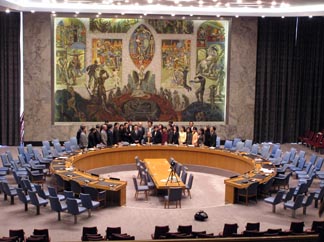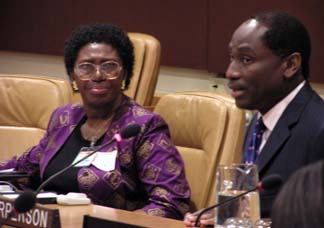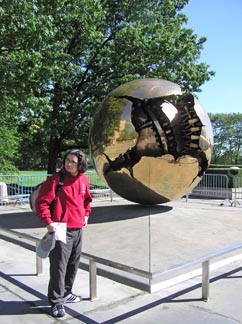Cornell students take an inside look at the United Nations
By Kerry Gilfillan

Mampela Mpela discovered there was no need to apologize for her strong accent when a group of Cornell University students toured the United Nations recently.
Mpela, a radio producer for the UN's Department of Public Information who hails from Lesotho, was expecting a homogenous, strictly English-speaking audience. Instead, she said, she was "relieved and pleasantly surprised" by the diversity of the group that visited UN headquarters in New York City on Sept. 30. "We all have accents," she said delightedly.
The 120 Cornell students who converged like pilgrims on the UN were diverse indeed. Some were international by citizenship, others by birth and yet others by academic interests.
Sponsored by Campus Life, the International Students and Scholars Office, Ujamaa and Faculty Programs, the UN trip brought together students who were native New Yorkers -- who paid quick visits to parents after the program -- and others, like Magno Alcandara, a visiting senior from the Monterrey Institute of Technology in Mexico, who bit into a bagel for the first time.
Deborah Pawlikowski, a West Campus residence hall director, said that in addition to fostering an awareness of diversity on campus, part of the aim of the program is to "encourage interaction between students and faculty in an informal setting." The previous week, Pawlikowski said, she accompanied a busload of North and West Campus residents to Yankee Stadium for a baseball game.

The UN trip was organized by Africana studies Professor N'Dri Assie-Lumumba, whose relationship with the UN dates back to the 1980s. Currently serving her second three-year term on the UN Committee on Development Policy, Assie-Lumumba is keen to encourage student interest in the UN. "People who think that the UN is solely composed of bureaucrats don't realize that there are a lot of academics in the UN bringing significant insight," she said.
After the students toured the UN with an Italian guide, four UN staff members gave presentations detailing different aspects of the world body's work. Translation between cultures and disciplines was a recurrent theme.
During the lull before the beginning of UN sessions, six empty translator's booths lined the walls of the conference room, labeled according to language: Arabic, Chinese, English, French, Russian and Spanish. As Mpela spoke about the framework and mission of the UN, students experimented with translation earpieces attached to the arm of each seat.
Following a talk by Goro Onojima, human rights officer with the High Commission for Human Rights, the theme of coordination through translation was picked up by James Sniffen, information officer for the UN Environment Program, who emphasized the organization's role in the "standardization of data-gathering" in less-developed regions of the world. Owing to the UN's coordination, Sniffen said, "the chemical composition of Eritrea's water can be compared to that of Bolivia." As environmental questions become more pressing, Sniffen said, the UN's moderating and harmonizing role will be crucial. He also addressed the question of "development without destruction" -- the possibility for societies to advance without destroying themselves.

When questioned on the UN's uncertain ability to enforce its resolutions, Sniffen said that perceptions do not always correspond to practical realities. "Discretion is a better tool for changing the ways of states or institutions, rather than publicly shaming or berating them," he said. "It's the job of NGOs [nongovernmental organizations] to put wayward governments in the headlines -- the UN makes changes from within through training programs."
Assie-Lumumba used her UN contacts to arrange for a talk by Abiodun Williams, principal officer in the office of UN Secretary-General Kofi Annan. With cameras flashing, Williams welcomed the Cornell students on behalf of the Secretary-General and indicated that since the work of the UN cannot be accomplished by one generation, he found the students' interest to be an encouraging sign. Referring to one of the challenges faced by the UN and the world at large, he affirmed the UN's commitment to combating terrorism, "no matter where it takes place or the reasons given for it."
Notwithstanding the nobility of its vision, UN reform has been a prominent question in the news of late. Christy Harzan '06, among others, asked about the UN Security Council, whose membership reflects the world power structure as it existed in 1945 and excludes Germany and Japan. In response, Kenyan tour guide Shadrack Mbogho acknowledged the debate about reform and the veto power of Security Council members and the recent oil-for-food scandal that has drawn attention to the UN's organizational structure, which many critics see as ineffective.
Flavien Glidja, a Humphrey fellow visiting Cornell from Benin, used a saying in his native language, Fon, to admonish uncooperative nations who are among the greatest obstacles to the UN's effectiveness: "The child who prevents his mother from sleeping will not sleep."
Kerry Gilfillan, a writer intern with Cornell News Service, is a native of South Africa.
Media Contact
Get Cornell news delivered right to your inbox.
Subscribe